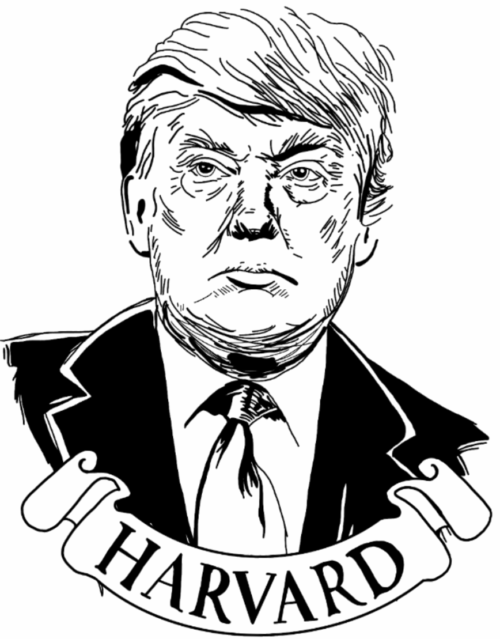Throughout late March and early April, Harvard University leadership has sent a series of emails to the institution’s affiliates: “The Promise of American Higher Education,” “Upholding Our Values, Defending Our University,” and “Our Commitment to Community,” among others. Written in response to moments of apparent national crisis, these messages raise questions about the role of University administration in shaping how students experience current events—do these carefully-composed messages truly offer reassurance, or do they simply signal symbolic engagement? Student responses across the College have offered insight into external perception of whether the school has been successful in threading a fine line between appeasing federal orders and preserving the values of the larger campus community.
Harvard has continued to release official statements to University affiliates acknowledging the gravity of these developments and their possible impact on campus. These communications aim to reflect the University’s values: a commitment to democratic norms, academic freedom, and civic responsibility.
These emails have become more relevant and frequent in recent years, as Harvard’s relationship with the Trump administration has been unusually turbulent. The University has become involved in legal challenges against key federal policies, notably including restrictions on international student visas and a freeze on over $2 billion in federal research funding. Harvard filed suit against the administration, arguing that the funding freeze was unconstitutional and jeopardized the institution’s research focus.
These recent judicial battles have particularly positioned the University not just as an observer of national politics but as an active participant, a reality that shapes how many recent or current students interpret the University’s public statements and its broader role in American higher education.
For many students, the frequency of these statements has become part of the backdrop of their college years. From the challenges of the 2021-2022 academic year, including the ongoing pandemic and political tensions, to the Jan. 6 Capitol insurrection’s aftermath, students have watched the University navigate how and when to speak out.
“I think they reflect Harvard’s values because the stakes are very real, which they must have known,” one anonymous senior said in an interview with the Independent.
“At this level, these statements matter tremendously. Harvard is an institution at the forefront of higher education. It has the opportunity to set the precedent for other universities, and it should do so responsibly,” an anonymous sophomore commented.
Others, however, question their importance amidst other opportunities to absorb the University’s stance through secondhand sources—in dining halls, within group chats, or through student publications. “I really have not paid much attention,” said Raphael Tourette ’26. “I read the Crimson headlines and that’s about it.”
Recent campus tensions have also influenced how these messages are received. Following the 2024 resignation of President Claudine Gay and ongoing debates around free speech and institutional neutrality, some students have reevaluated the credibility and intent behind University-wide communications. The statements issued in response to Trump-related news are now part of a broader conversation about Harvard’s willingness, or reluctance, to speak forcefully on political issues.
“It’s important that a university like Harvard pave the way for other schools, no matter how acclaimed or endowed, to stand up to the federal government in cases of abuse of power,” Will Sullivan ’28 said.
Still, students also believe the University isn’t doing enough, especially considering the breadth of students now affected by Trump-era policies. “More could be done to mitigate stress and fear for students being targeted by the Trump administration,” Sullivan added.
These statements raise broader questions about which events prompt institutional responses and how those decisions shape perceptions of equity and leadership on campus. Moreover, are these statements meaningful expressions of concern or merely symbolic gestures intended to maintain the appearance of engagement?
“[I think these statements are] mostly performative, but I know the school is also trying to remain diplomatic and make everybody happy,” Tourette said.
Others, however, disagree. “Had it been performative, I do not think they would have risked as much,” the anonymous senior explained. “I believe that they both reflect Harvard’s values and are excessively performative, perhaps for the purpose of garnering institutional support,” an anonymous junior said.
Regardless of interpretation, the messages have become part of the background noise of student life, appearing alongside administrative updates and event announcements.
The language of these emails often avoids explicit criticism or partisan framing, which some interpret as an attempt to remain diplomatically neutral. Others argue that neutrality, in moments of democratic uncertainty, carries its own kind of political weight. “They have a platform and should use it,” the sophomore said, “especially when the alternative is acquiescence.”
Looking ahead, it remains uncertain whether the next generation of undergraduates will demand more from the administration. Moreover, as the Class of 2025 prepares to graduate, students are leaving a Harvard, which has navigated a turbulent political era through measured statements and cautious messaging.
Whether those emails offered reassurance or frustration, they likely shaped how this class experienced institutional voice—and institutional silence—at a time when both were closely scrutinized.
Christina Shi ’27 (christinashi@college.harvard.edu) wonders if her last Harvard email will also be about Donald Trump.

